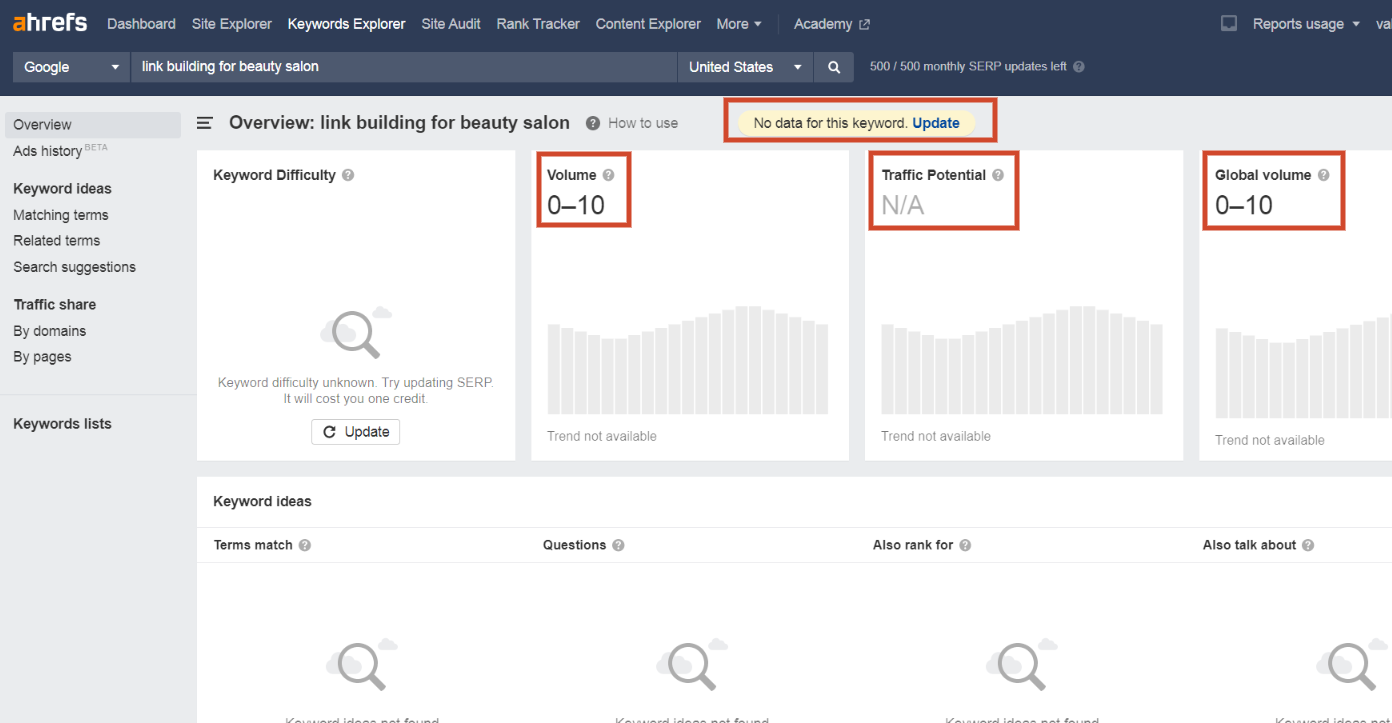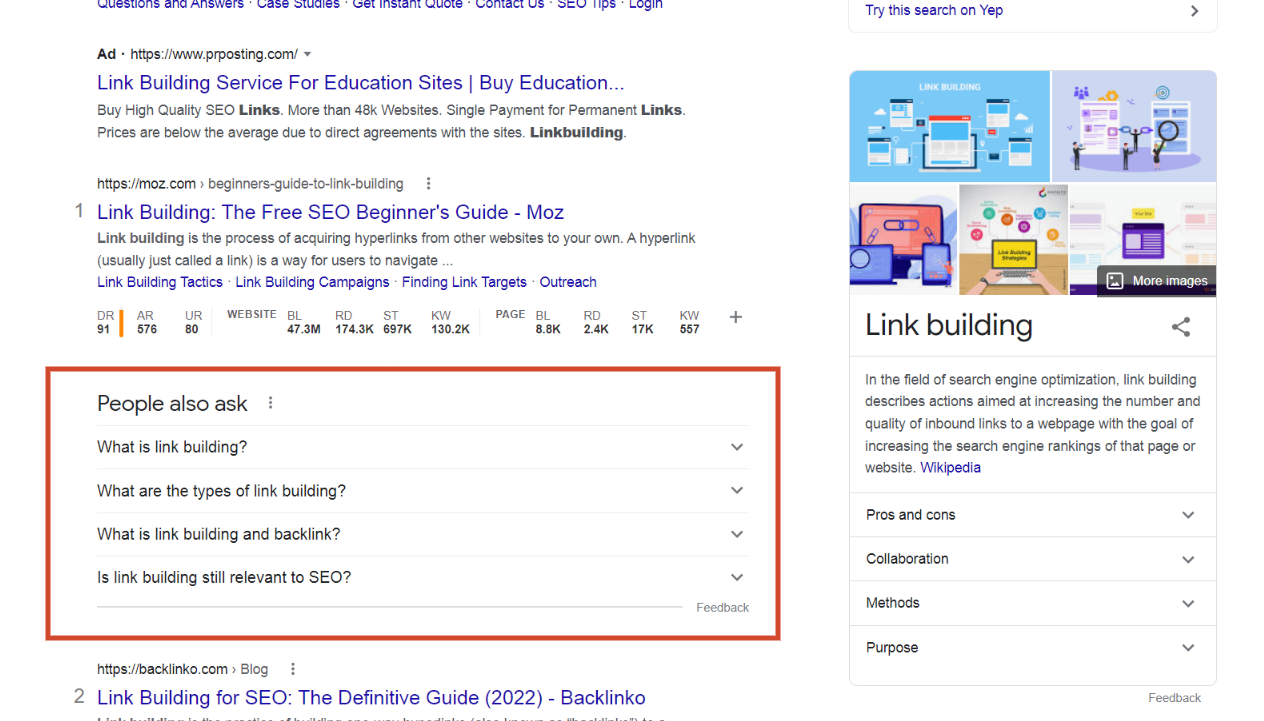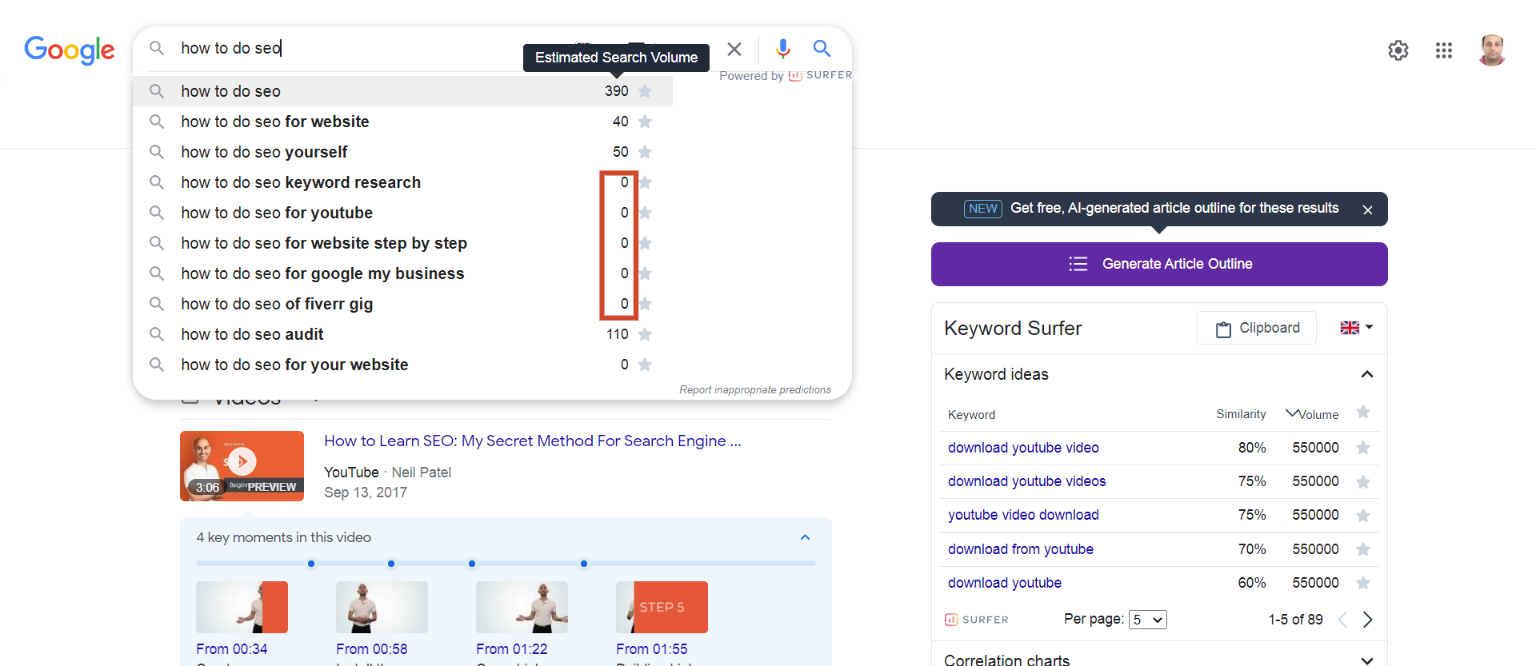Why You Should Target Zero Search Volume Keywords via @sejournal, @KaitlynnFrank
Zero volume keywords can have a major impact on your traffic. Read on to learn the benefits and how to use them to your advantage. The post Why You Should Target Zero Search Volume Keywords appeared first on Search...

Many online businesses ignore keywords with zero search volume because they think no one is searching for that term.
While it may be true that there is minimal search volume, online businesses in saturated markets can easily target these keywords and dominate a search space without much competition.
What Are Zero Search Volume Keywords?
Zero search volume keywords are hyper-focused long tail queries for which tools cannot provide data on search history, or have low search volume.
These queries are typically longer than keywords with high search volumes and are extremely specific.
The keyword “link building” has hundreds of thousands of searches.
If you narrow the search term (i.e., get more specific in your query), the competition gets lighter and lighter.
For example, the query “link building for beauty salon” has zero search volume – but it’s a question that may be asked by users doing SEO for a beauty salon and, thus, worth optimizing for.
 Screenshot from Ahrefs, August 2022
Screenshot from Ahrefs, August 2022
What Is the Difference Between Long Tail and Zero Search Volume Keywords?
Zero search volume keywords are the same as long tail search queries, which usually contain at least four words.
Users can phrase these queries in many different ways. So, while each question asked separately has nearly zero search volume – all of them combined have considerable search volume.
Take the example above. Users can search the same question with different variations, like “how to do link building for beauty salon,” or “build links for beauty salon.”
Both are essentially different versions of the same question, each of which may have almost zero search volume on its own. But when combined, they may have a significant search volume.
So when optimizing, one should do so with the user’s search intent in mind.
If you optimize for one variation of that user’s intended question (and answer), your webpage will likely appear in the SERP (search engine results pages) for others.
That’s because Google’s machine learning algorithms can understand that these different queries likely have the same intent, with the help of BERT or MUM. And that’s why it works!
Big name companies are not targeting these lower-volume keywords.
This keyword space is the space that smaller businesses can dominate with little-to-no competition.
Can You Trust Keyword Tool Planners?
Of course, you can – to an extent.
You may notice that these tools can differ widely regarding search volume.
That’s because keyword tools make their “best guess” for search volume depending on the information they access.
So, for example, while one tool may show that keyword has a search volume of 2,900, another may show the keyword at 9,900 search volume.
Additionally, keyword tools don’t capture low-volume keywords well.
That may be because tools need a certain amount of data before the keyword can register in their database.
These low-volume keywords are pushed aside because they are perceived as having little to no search volume.
So, what can we do?
Instead of taking keyword planners at their word, we can use them as a guide.
Use these tools to discover new keywords, but don’t forget to do further research to know if those keywords will help you reach your SEO goals.
Benefits Of Targeting Zero Search Volume Keywords
Less Competition
As stated before, many SEO professionals disregard zero volume keywords because they think no one is searching for them.
So, you now have an advantage over your competitors because they are not targeting these keywords.
Less competition for keywords means there is a better chance to rank for that term with unique, thoughtful, optimized content.
Target The Right Audience
Zero volume keywords are typically hyper-focused, which means they’re highly relevant to your audience.
Unfortunately, these queries are not often answered with unique, thoughtful content.
Therefore, your site could be the first to respond and rank for these queries; ideally, you can become an authority on the subject.
While there is no data on how many people search for these keywords, you can get a good idea of what they’re looking for based on the landing pages indexed by Google and the query itself.
In addition, further competitor research can show what information may be missing from already written content but could be pertinent to the searcher’s knowledge.
While you may not get thousands of new customers, you may get a few highly qualified customers ready to convert.
Generate Traffic
If your business ranks well for high-volume keywords, you may want to pivot your SEO strategy to target zero-volume keywords.
Think of all the customers you haven’t reached yet! 15% of queries in Google have never been asked.
That means you might be losing up to 15% of your potential traffic!
Additionally, suppose you’re targeting a keyword with zero or minimal search volume. In that case, users who click through to your page will likely be coming from long-tail queries that other businesses don’t target.
This allows you to earn more organic clicks and leads from long-tail queries than would be possible if you were targeting higher volumes of searches.
How To Find The Best Zero Search Volume Keywords
SEO Keyword Research
The first step to finding the right keywords is knowing what people are searching for.
So, you must conduct keyword research to determine what keywords people use when searching for your website, products, or services.
Look for precise, long-tail keywords. These keywords are less competitive and have less search volume but can be easily dominated with the right content.
Here are some ways to find these long-tail keywords:
Use the “people also ask section” of the SERP, which shows related queries.
 Screenshot of Google SERP for “link building,” August 2022
Screenshot of Google SERP for “link building,” August 2022
This tool can help you brainstorm what other topics may be related to your main query.
It’s available in mobile and desktop search results, so you can find some good long-tail keywords there.
Google Autocomplete is another excellent way to find more keywords. You can install the free keyword surfer browser add-on, which displays suggested keywords and their search volumes.
 Screenshot from Google SERP, August 2022
Screenshot from Google SERP, August 2022
Autocomplete suggestions appear after you type a few letters into the search bar, based on what others are searching for.
Understanding Relevance
When you search for something, you’re looking for relevance. So, you want to see what’s most relevant to your query.
But when you’re targeting zero search volume keywords, you don’t have any data.
How do you know if they’re relevant?
That’s where your own experience comes in.
Understanding the target phrase will help you know its use and what people are searching for – which can help you determine whether it’s relevant to your business.
Look for your keywords in forum discussions, social media, and the SERPs.
If someone has already asked about your topic, chances are they’re interested in it.
You can also use tools like Semrush or Moz to look at what people are searching in forums and social media (just remember to eliminate brand names).
Related Keywords
The more people look for related terms, the better.
That means the keyword and its variations are favored.
You can find related keywords by looking at other websites’ content or searching Google for your primary keyword.
If you do a Google search and see recommendations on similar topics, those are great places to start looking for new keywords.
In addition, Google often suggests related searches when you type a query into its search bar, so try typing your main keyword into Google and seeing what suggestions come up.
Strategies To Drive Traffic With Zero Search Volume Keywords
Aim For A Wide Variety Of Terms
Aim for various terms to capture the intent of all visitors who land on your site.
Remember the beauty salon query example from earlier? Similarly, if someone searches for “link building services,” they are likely looking to buy a specific service, not just general SEO services.
By adding relevant keywords to your strategy, you’re effectively targeting more traffic with the same intent.
For example, if you’re targeting “link building services,” there is a good chance some people will also search for things like, “why link building,” ‘link building benefits,” or “link building strategies.”
These terms may have lower search volume, but they can still be valuable when added to your strategy.
Capitalize On Buying Keywords
Buying keywords are those such as “best,” “top,” or “vs.”
These keywords are aimed at readers who may be ready to buy. Often, these keywords are lower in volume because they are very specific.
Knowing which keywords people are searching for is essential if you’re selling a product or service. You can use this information to help you increase your sales conversions.
These types of keywords can help you target people who are looking for your product or service.
If you can target these phrases, you can reach potential customers who have not yet started researching, but will soon be looking for information about your product or service.
It’s easy to see what people are looking for by checking out the search results on Google or Bing (or whatever search engine you use).
These search results show the most popular searches related to your industry, products, or services that you offer.
Choose Relevant Keywords That Pay Off
Your keywords are the foundation of your SEO strategy.
You must choose relevant keywords to help you achieve your business goals.
You want to target phrases commonly searched for by potential customers and related to your niche. Then, think about the problems your product/service solves and search for those types of terms.
That might seem like common sense, but it’s worth mentioning since it’s easy to get caught up in wanting to rank for as many keywords as possible.
Use Low-Volume Keywords To Build Awareness In A New Niche
When starting with a unique niche, it’s tempting to target high-volume keywords to get more traffic.
But if you don’t have any authority in that space and your content isn’t top-notch, then you’ll never be able to convert those visitors into paying customers.
Instead, target zero search volume keywords that are specific to the industry.
That way, you can build awareness of your brand and start earning trust among customers who are looking for something new.
Once you’ve built enough content around your target keyword, it will start ranking on page 1 of Google results – and stay there as long as the content is relevant and up-to-date.
As a result, you’ll have more credibility in the eyes of potential customers who are looking for something new in their industry, but unsure where to look.
Zero volume keywords can majorly impact your site in terms of organic traffic and rankings.
By understanding how to use these keywords for your benefit, they can help target a new audience you were previously unaware of.
More resources:
A Complete Guide to Keyword Search Volume for SEO What Is The Difference Between Search Queries And Keywords? How to Do Keyword Research for SEO: The Ultimate GuideFeatured Image: Cast Of Thousands/Shutterstock

 MikeTyes
MikeTyes 












![How I Built 5,660 Backlinks in 30 Days [New Strategy]](https://api.backlinko.com/app/uploads/2022/04/how-i-built-5660-backlinks-in-30-days.png)

















